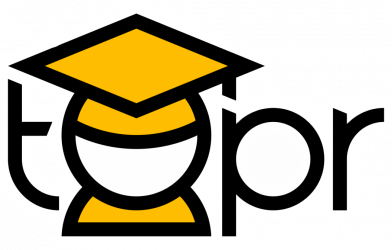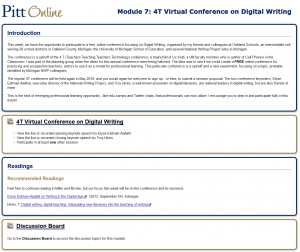Tags: Activity, Community, Community of Inquiry, Conference, Identity, Interaction, Participation, Professional, Scaffolding, Synchronous
Description
Regardless of academic discipline, educational programs in the realm of higher education are charged with preparing graduates with the skills, knowledge, and dispositions needed for the workplace (Trede, Macklin, & Bridges, 2012). Part of this preparation entails scaffolding the development of students’ professional identity so they can “develop a sense of who they are and how they are to interact with others within their professional world” (Sutherland & Markauskaite, 2012, p. 747). For course instructors, this translates into providing meaningful opportunities within the course curricula for students to learn and practice the tenets of professionalism. Scholars have identified three core pathways to professional growth, by: (a) exercising specialized knowledge and skills, (b) identifying as a member of a community with shared practices and values, and (c) having a sense of responsibility and service to a given professional community (Wilson et. al, 2013). Instructors can easily incorporate these three principles of professionalism into any online course by designing module content around a Learning Community (LC), requiring short or long-term participation in a designated LC.
An online Learning Community (LC) is a Web-based network, or community of practice (Lave & Wegner, 1991), for professional learning where members work interdependently to build knowledge and share experiences, with a focus on praxis and collaboration (Duncan‐Howell, 2010). Online LCs are active learning spaces that use a combination of synchronous (live chat, webinars, etc.) and asynchronous communication tools (discussion forums, wikis, etc.) to connect members around professional topics of interest. Although members are typically active professionals in a career field, aspiring professionals like students, may join. Many online LCs openly exist on the Web to support professionals in fields such as teaching, engineering, and nursing. Online LCs have been shown to benefit participants by expanding their repertoire of resources for problem-solving, including access to new information, people, and ideas (Lock, 2006). They also encourage peer support and guidance, as well as reflective thinking about authentic issues of practice (Conrad, 2005).
Link to example artifact(s)
Context
Using a Free Virtual Conference in a New Media Literacies Course
Within the context of an online program for graduate education students, the University of Pittsburgh’s Dr. Rae Mancilla (instructional designer) and Dr. Laura Roop (instructor) focused one of fifteen course modules on students’ required participation in an online LC for supporting teachers’ integration of technology. As future classroom teachers of 21st century learners, it was critical for this student population to gain competency in using digital tools through firsthand use, as well as to understand their pedagogical value for student learning.
To accomplish this goal, all module content (introduction, readings, discussions, and assessments) was organized around students’ attendance of a free 4T Virtual Conference on Digital Writing (image file). Taking advantage of online LCs’ on-demand format (“anytime, anywhere”) students were given the option to attend the live conference sessions synchronously or view the recorded sessions asynchronously. Specifically, students were required to attend/view the opening and closing keynote addresses, as well as engage in at least one other conference session.
To familiarize students with the keynote speakers and their work and expertise, readings were selected accordingly. A video interview with one of the speakers was also included to forge personal connections between students and their online LC “mentors.”
After attending the virtual conference as participants, students were encouraged to further develop the specialized knowledge and skills they acquired with fellow classmates through the course discussion forum(image file). Discussion prompts were designed for ongoing reflection and peer collaboration around the broad issue of how emerging technologies can be integrated into classrooms and schools. The discussion forum also served as a formative assessment tool for the instructor to gauge students’ level of engagement in the virtual conference and overall comprehension of the topics presented.
A summative task was also created to inspire students to identify as contributing members of the OLC and to foster their continued commitment to the professional network. This graded assignment asked students to draft their own conference proposal (pdf file) for submission to the following semiannual meeting, helping them assume the role of presenter rather than participant in the online LC. Besides being an authentic, performance-based application of the course content, the conference proposal assessment fosters students’ awareness of the responsibilities and service required of active professionals.
Artifacts
- Example of framing a virtual conference (image file) for student participation
- Example of course discussion prompt (image file) facilitating reflection on the virtual conference
- Example of graded assignment (and scoring rubric) (pdf file) in which students prepare a conference proposal
Link to scholarly reference(s)
Conrad, D. (2005). Building and maintaining community in cohort-based online learning. Journal of Distance Education, 20(1), 1-20.
Duncan‐Howell, J. (2010). Teachers making connections: Online communities as a source of professional learning. British Journal of Educational Technology, 41(2), 324-340.
Lave, J., & Wenger, E. (1991). Situated learning: Legitimate peripheral participation. Cambridge University Press.
Lock, J. V. (2006). A new image: Online communities to facilitate teacher professional development. Journal of Technology and Teacher Education, 14(4), 663-678.
Sutherland, L., & Markauskaite, L. (2012). Examining the role of authenticity in supporting the development of professional identity: an example from teacher education. Higher Education, 64(6), 747-766.
Trede, F., Macklin, R., & Bridges, D. (2012). Professional identity development: a review of the higher education literature. Studies in Higher Education, 37(3), 365-384.
Wilson, A., Åkerlind, G., Walsh, B., Stevens, B., Turner, B., & Shield, A. (2013). Making “professionalism” meaningful to students in higher education. Studies in Higher Education, 38(8), 1222-1238.
Citation
Mancilla, R. (2016). Facilitate student participation in a virtual conference of a professional association. In B. Chen & K. Thompson (Eds.), Teaching Online Pedagogical Repository. Orlando, FL: University of Central Florida Center for Distributed Learning. https://topr.online.ucf.edu/facilitating-student-participation-in-a-virtual-conference-of-a-professional-association/.Post Revisions:
- August 25, 2020 @ 15:52:20 [Current Revision]
- August 25, 2020 @ 15:52:20
- July 31, 2020 @ 17:31:16
- September 24, 2018 @ 19:38:56


